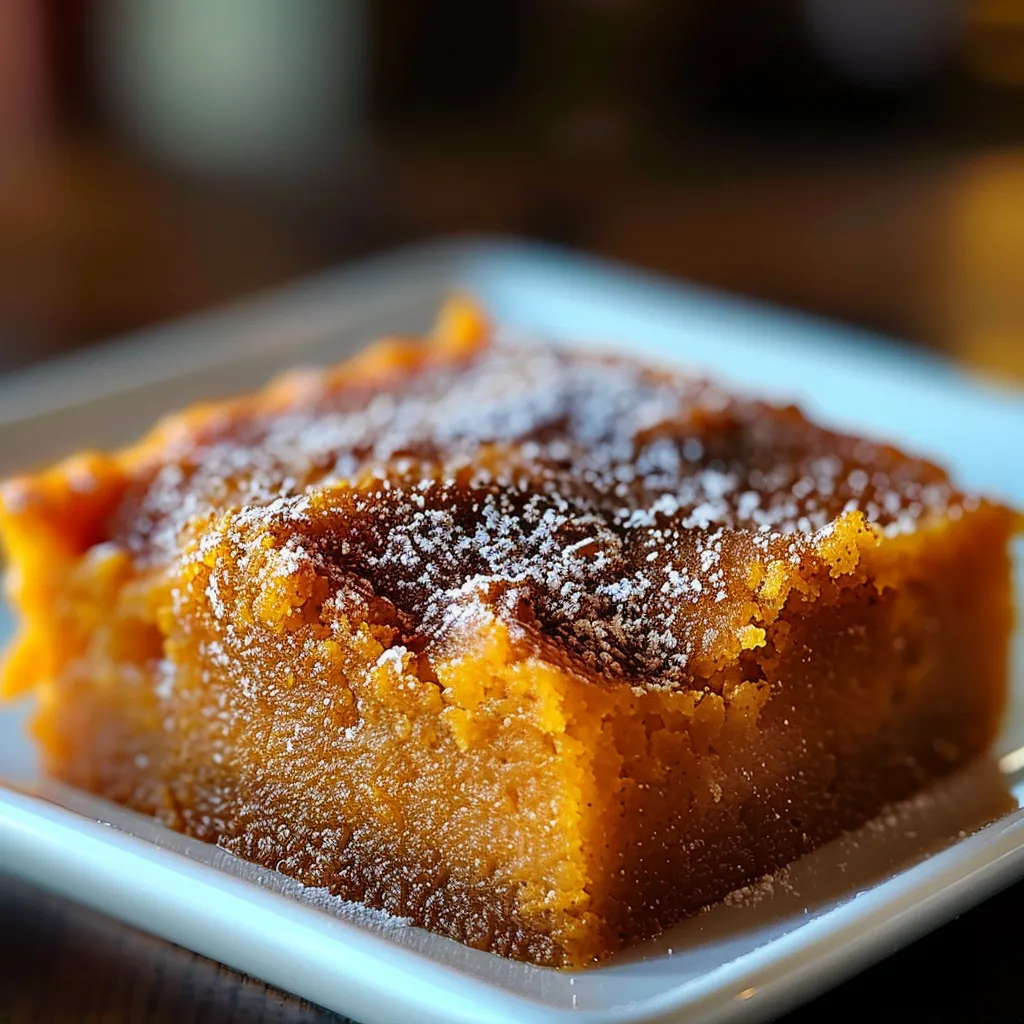 Pin to Favorites
Pin to Favorites
This sweet potato pound cake bridges the gap between dessert and holiday side dish, turning humble sweet potatoes into a moist, spiced treat that captivates with every bite. The natural sweetness of roasted sweet potatoes creates a depth of flavor you simply cannot replicate with artificial flavoring.
I discovered this recipe during a fall harvest celebration when searching for something beyond the traditional sweet potato casserole. My guests were stunned when I revealed the secret ingredient creating that incredible moisture and natural sweetness.
Ingredients
- Sweet potatoes: Choose firm, copper colored potatoes with no soft spots for the sweetest flavor profile
- Unsalted butter: The fat content creates that signature pound cake texture while allowing you to control salt levels
- Eggs: Room temperature eggs incorporate better ensuring a uniform cake structure
- Vanilla extract: Pure vanilla balances the earthy sweet potato notes
- Cinnamon: Fresh ground cinnamon brings warmth that complements the natural sweetness
- Nutmeg: Freshly grated nutmeg offers complex aromatic notes impossible to achieve with pre ground
- All purpose flour: The protein content provides just enough structure without making the cake tough
- Baking powder: This leavener ensures proper rise while maintaining density
- Milk: Whole milk creates richness that enhances the velvety texture
Step-by-Step Instructions
- Roast Sweet Potatoes:
- Bake sweet potatoes at 400°F until extremely tender when pierced. The skin should practically separate from the flesh. This slow roasting concentrates sweetness and creates caramelization that boiling simply cannot achieve. Cool slightly before peeling and mashing until absolutely no lumps remain.
- Prepare Baking Pan:
- Thoroughly grease every corner of your loaf pan with butter then dust with flour, tapping out excess. This critical step ensures your finished cake releases perfectly with that beautiful golden crust intact.
- Cream Butter and Sugar:
- Beat softened butter and sugar until the mixture becomes noticeably lighter in both color and texture. This process incorporates air which provides essential structure. Avoid shortcuts here minimum three full minutes of mixing creates the proper foundation.
- Incorporate Eggs:
- Add each egg individually, allowing it to fully disappear into the butter mixture before adding the next. This gradual approach prevents curdling and ensures proper emulsification for a smooth batter. Scrape down the sides between additions.
- Add Flavor Components:
- Fold in the mashed sweet potatoes along with vanilla and spices until completely integrated. The batter should now display a uniform orange hue without streaks of white from the butter mixture. This indicates proper incorporation.
- Prepare Dry Ingredients:
- Whisk flour, baking powder and salt together to ensure even distribution of leavening agents throughout the batter. This prevents pockets of bitterness that can occur with uneven mixing.
- Combine Wet and Dry:
- Alternating between dry ingredients and milk creates proper hydration without developing gluten. Begin and end with flour, mixing just until combined after each addition. Overmixing now will create a tough final product.
- Bake to Perfection:
- Pour batter into prepared pan, smoothing the top to ensure even baking. The thick batter should hold ridges from your spatula. Bake until the internal temperature reaches 200°F or a toothpick comes out with a few moist crumbs, not wet batter.
- Rest Before Serving:
- Allow the cake to rest for the full recommended time. This patience allows the flavors to meld and the moisture to distribute evenly throughout, transforming a good cake into an exceptional one.
 Pin to Favorites
Pin to Favorites
The roasted sweet potatoes are truly the star of this recipe. My grandmother taught me to always roast rather than boil them, explaining that water dilutes flavor while roasting concentrates it. One bite proves her wisdom every single time. The aroma that fills the house during baking has become synonymous with fall gatherings in our home.
Sweet Variations
This versatile batter welcomes creative adaptations. Fold in one cup of toasted chopped pecans for delightful texture contrast, or add dried cranberries for pops of tartness. The sweet potato base plays beautifully with warm spices try adding cardamom or ginger for a unique flavor profile. For special occasions, drizzle the cooled cake with a simple glaze made from powdered sugar, cream, and a splash of bourbon.
Troubleshooting Tips
Achieving the perfect texture depends on properly roasted sweet potatoes. Undercooked potatoes create a grainy texture, while overcooked ones can make the cake too dense. The potatoes should yield easily to a fork throughout before mashing. If your cake seems dry, consider reducing baking time by five minutes in future batches. Dark metal pans conduct heat more efficiently than light ones, so adjust accordingly if switching between pan types.
Serving Suggestions
This versatile cake transitions effortlessly between meals. Serve thin slices toasted alongside morning coffee for breakfast, or transform it into an elegant dessert with a dollop of lightly sweetened whipped cream and a sprinkle of candied pecans. During holiday gatherings, I often serve it alongside traditional pumpkin pie as an alternative that always disappears first. The subtle sweetness pairs surprisingly well with savory dishes, making it an unexpected addition to your holiday table.
 Pin to Favorites
Pin to Favorites
Serve and enjoy this sweet potato pound cake with gratitude and love for its warmth.
Frequently Asked Questions
- → Can I use canned sweet potatoes for this dish?
Yes, you can use canned sweet potatoes as a shortcut. Just ensure you drain and mash them well to match the intended texture.
- → What can I use as a substitute for all-purpose flour?
You can substitute all-purpose flour with a gluten-free blend or almond flour, but note that it may alter the texture slightly.
- → How do I know when the pudding is done baking?
The pudding is ready when a toothpick inserted into the center comes out with just a few moist crumbs, and the edges begin to pull away from the pan.
- → Can I make this ahead of time?
Absolutely! This dish tastes even better after resting for a few hours or overnight, making it a perfect make-ahead option.
- → What are some serving suggestions?
Serve it warm or at room temperature with a dollop of whipped cream, a drizzle of caramel, or even a scoop of vanilla ice cream for an extra treat.
- → Can I add nuts or other mix-ins?
Yes, feel free to add chopped pecans, walnuts, or even raisins to the batter to enhance the flavor and texture.
